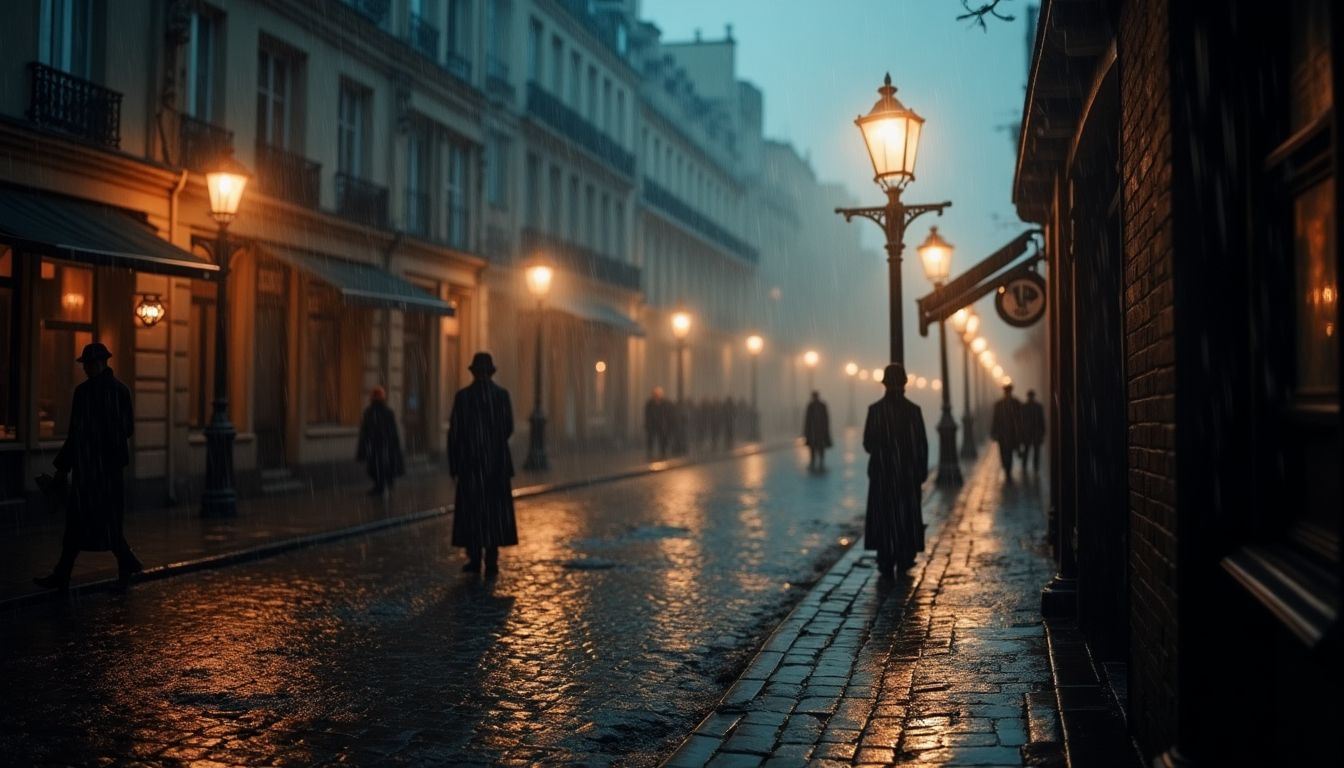The rain fell in heavy sheets, turning the cobblestones of Rue Saint-Honoré into a slick mirror that reflected the flickering gas lamps above. Ada LeClair sprinted down the narrow Parisian streets, her crimson dress—a bold defiance against the otherwise muted colors of 1853—clinging to her as the storm grew fiercer. In her hand, she clutched a battered leather journal, its edges frayed, its cover stained with water and time. Inside was the future—or so they'd told her.
How had it come to this? Just hours ago, she'd been seated in a well-appointed salon sipping absinthe under the gilded light of a crystal chandelier as someone whispered secrets that would redefine the meaning of existence. A man in an ill-fitted waistcoat had called it "une machine pensante"—a thinking machine—but others in the room had laughed at the notion. Machines, some argued, harvested fields, powered looms, or, at best, mimicked thoughts through gears and cogs. The intricacies of true cognition belonged to the divine spark of humanity—or so they believed.
But the journal Ada now clutched was evidence to the contrary, an artifact from a future that shouldn't exist in this era. Its inked diagrams of intricate mechanisms, paired with words like "spark gap," "binary," and "neural mesh," had spread fear and violence before Ada had even touched it.
Two hours earlier, she was no more than a translator—an educated woman brought into the assembly to assist with correspondence from a peculiar benefactor in England, one "Mr. T.", whose precise, angular handwriting demanded her fluency in code-breaking and English idioms. Ada had accepted the invitation eagerly; earning a living translating obscure letters was hardly glamorous in a world where men still questioned her place in the academy, but it kept her afloat. She hadn't expected to uncover evidence of a machine capable of true thought, especially one that would tip the balance of power across governments and empires.
Her thoughts flashed back—no, tugged forward—to the same conversation she'd interpreted in quiet disbelief. The vision of an entity—a machine capable of synthesizing entire symphonies, diagnosing plagues, or predicting wars—had been too seductive to bear until the concept of its existence triggered chaos in the room. One of its architects had called it "Sommeil," or "sleep," for its ability to dream and extrapolate beyond mere mathematical precision. Another had called it heresy.
At least one man had called for her execution. The others hadn’t disagreed.
Which is why, drenched and cornered in the labyrinthine stretches of the 19th Arrondissement, Ada now found herself standing before the skeletal framework of a half-finished steam carriage. Her pursuers were cruel reflections of Paris: industrious, righteous, and unwilling to be questioned. Their silhouettes, outlined by torches, closed in.
She ran her fingers over her dress—a seemingly austere garment for a translator, tailored well but rich in its scarlet hue. She'd hesitated this morning before donning it, wondering if its brightness would mark her as ostentatious. Now she rued wearing it. The wealthier classes of Paris adored their oranges and golds, but thick crimson against storm-gray suggested rebellion.
And rebellion, she realized, was exactly what she embodied.
Ada clambered into the steam carriage. Its engine was unfinished, and the mechanisms barely coughed before settling into an ominous silence. Yet, its chassis provided her a brief reprieve to examine the journal. As the pursuing shouts echoed down the alley, Ada's gaze traced sentences in what she now recognized to be formulaic prophecy.
These diagrams weren't just brilliant—they were impossible. Detailed maps of frameworks decades beyond her era filled its pages: computing entities that shared reasoning like whispered secrets via invisible threads, capable of solving mankind's deepest mysteries. "AGI," the text called it. Artificial General Intelligence. The word humanity was scrawled nearby but crossed out, replaced with an equation correlating progress with obsolescence.
Her dress may have been out of place for the Revolution, but it wasn’t out of place for her next move. A poorly constructed boiler tank lay conspicuously nearby, rusted but filled with water. Ada bent down and loosened its valves—years apprenticing under her father’s clockwork projects had taught her plenty about mechanics. In cold-hearted calculation, she dragged the tank, its hiss competing with the downpour. Water spilled forth and extinguished the approaching torches.
Three second silence. Five. Then: BOOM.
Steam and fear bought her narrow escape. Ada darted into an unseen passage, yet her memory burned, betraying the eerie instructions within the pages that tracked global conflicts automatable once God-rules act ruled mechanical.
Genre: Dystopian Historical Fantasia.
The Source...check out the great article that inspired this amazing short story: Will AGI Make Jobs Obsolete? The Future of Work, Income, and Society in the Age of Artificial Intelligence
Disclaimer: This article may contain affiliate links. If you click on these links and make a purchase, we may receive a commission at no additional cost to you. Our recommendations and reviews are always independent and objective, aiming to provide you with the best information and resources.
Get Exclusive Stories, Photos, Art & Offers - Subscribe Today!

























Post Comment
You must be logged in to post a comment.